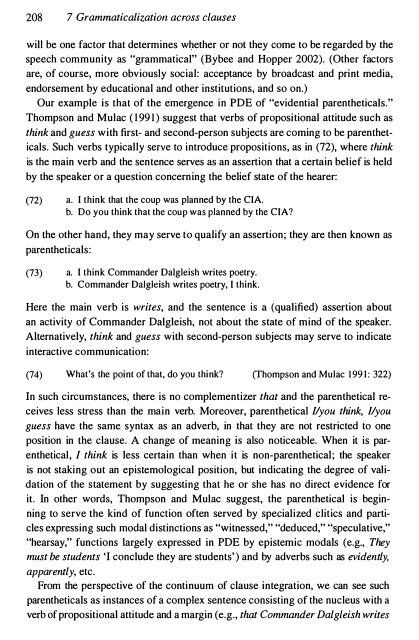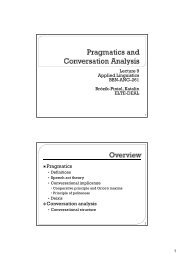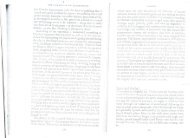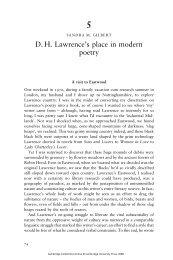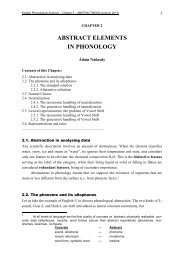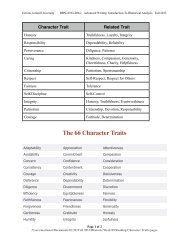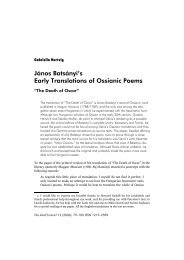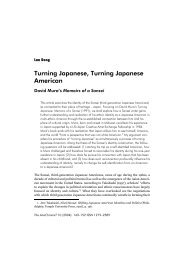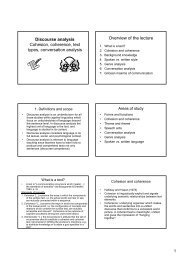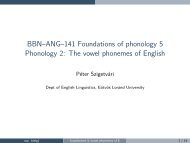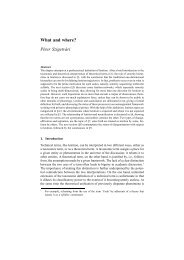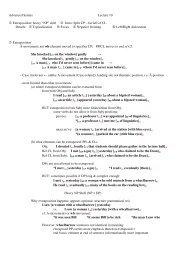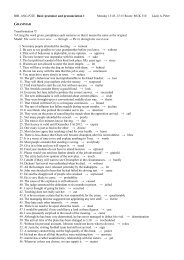Gram - SEAS
Gram - SEAS
Gram - SEAS
You also want an ePaper? Increase the reach of your titles
YUMPU automatically turns print PDFs into web optimized ePapers that Google loves.
208 7 <strong>Gram</strong>maticalizatioll across clauses<br />
will be one factor that determines whether or not they come to be regarded by the<br />
speech community as "grammatical" (Bybee and Hopper 2002). (Other factors<br />
are, of course, more obviously social: acceptance by broadcast and print media,<br />
endorsement by educational and other institutions, and so on.)<br />
Our example is that of the emergence in PDE of "evidential parentheticals."<br />
Thompson and Mulac (1991) suggest that verbs of propositional attitude such as<br />
think and guess with first- and second-person subjects are coming to be parentheticals.<br />
Such verbs typically serve to introduce propositions, as in (72), where think<br />
is the main verb and the sentence serves as an assertion that a certain belief is held<br />
by the speaker or a question concerning the belief state of the hearer:<br />
(72) a. I think that the coup was planned by the CIA.<br />
b. Do you think that the coup was planned by the CIA?<br />
On the other hand, they may serve to qualify an assertion; they are then known as<br />
parentheticals:<br />
(73) a. I think Commander Dalgleish writes poetry.<br />
b. Commander Dalgleish writes poetry, I think.<br />
Here the main verb is writes, and the sentence is a (qualified) assertion about<br />
an activity of Commander Dalgleish, not about the state of mind of the speaker.<br />
Alternatively, think and guess with second-person subjects may serve to indicate<br />
interactive communication:<br />
(74) What's the point of that, do you think? (fhompson and Mulac 1991: 322)<br />
In such circumstances, there is no complementizer that and the parenthetical receives<br />
less stress than the ma.in verb. Moreover, parenthetical //you think, //you<br />
guess have the same syntax as an adverb, in that they are not restricted to one<br />
position in the clause. A change of meaning is also noticeable. When it is par<br />
enthetical, / think is less certain than when it is non-parenthetical; the speaker<br />
is not staking out an epistemological position, but indicating the degree of vali<br />
dation of the statement by suggesting that he or she has no direct evidence for<br />
it. In other words, Thompson and Mulac suggest, the parenthetical is begin<br />
ning to serve the kind of function often served by specialized c1itics and parti<br />
cles expressing such modal distinctions as "witnessed," "deduced," "speculative,"<br />
"hearsay," functions largely expressed in PDE by epistemic modals (e.g., They<br />
must be students 'I conclude they are students') and by adverbs such as evidently,<br />
apparently, etc.<br />
From the perspective of the continuum of clause integration, we can see such<br />
parentheticals as instances of a complex sentence consisting of the nucleus with a<br />
verb of propositional attitude and a margin (e.g., that Commander Dalgleish writes


